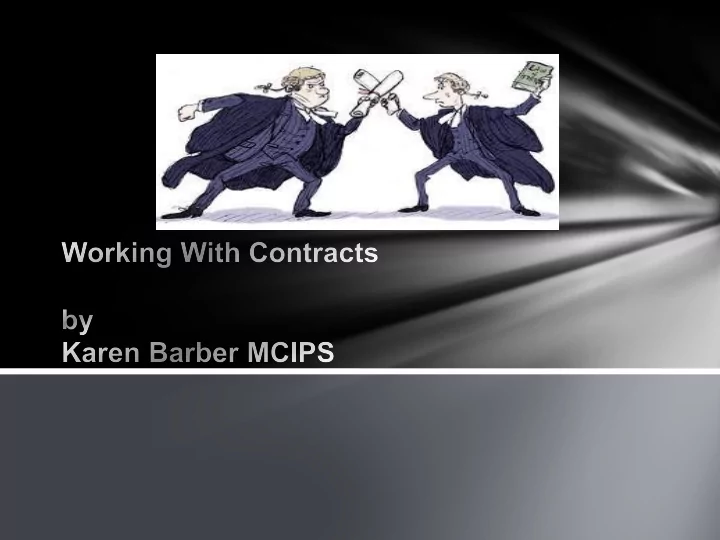

Different Types of Contracts • Goods and Services • Works • Minor Works • TUPE (Transfer and Undertaking of Protection of Employment) • NIL Cost • Framework Agreements • Supply of Goods Act 1982
Steps to Creating a Contract • Tender Process (OJEU or Non-OJEU) • Advertised via Tender Portal (i.e. www.mytenders.com) • Presentation Stage • Negotiations (if applicable) • Contract Award • Standstill Period • Contract Creation
Example of Our Contracts Our contracts are usually made up of the following details: • The Agreement • The Schedules (made up of the following): Service General Conditions for the Purchase of Services Financial Charges Appendix (A) Tender Specification Appendix (B) Tenderer’s Tendered Response Two copies are produced and signed by both parties
Contract Variation • Title of Change: Amendments to the Conditions of Contract dated 1 st January 2011 for the Supply of X Services. • Clause Condition: Under Change Control Clause 20 to 20.5 of the Conditions of Contract, Schedule 3 Key Performance Dates, and Schedule 4 Financial Charges, the Contract is hereby amended, as follows: Details of the change are made here, i.e. the current service is extended and will run for 6 days per week at the current rate of £50 per day. • Date of Effect: Variation of Contract shall take effect from the date of acceptance of this amendment. All other Terms and Conditions of the Contract remain unchanged. • Confirmation: Please, confirm your acceptance of this amendment by and agreeing this change. Signed by: Name and position of authorised signatory For and on behalf of: Name of Company/Organisation
S ervice Level Agreement (SLA) • Purpose • Joining Form • Supporting Suppliers (if applicable) • Confirmation and Start Date • Authorised on Behalf of (name of organisation) • Agreed on Behalf of (name of supplier) • Action Points (to be delivered by supplier) Clarification of Service Level Agreement Safeguarding and Compliance (if applicable) Management Information, Performance Reviews and Audits Price List and Charges • Terms and Conditions of Purchase
Good Contract Practice • Understanding tendering rules and regulations (including EU Legislation) • Understanding the nature of the supplier’s business • Greater buyer/supplier working relationship • Fulfilling buyer/supplier needs to ensure best practice • Review meetings • Key Performance Indicators (KPI) • Keeping suppliers aware of any contractual changes (contract variation)
Bad Contract Practice • Badly worded contracts • Misleading contract information • Contractual changes – no negotiation • Additional contract clauses – no negotiation • Removal of clauses – no negotiation • Affect on the buyer/supplier relationship
Any
Recommend
More recommend